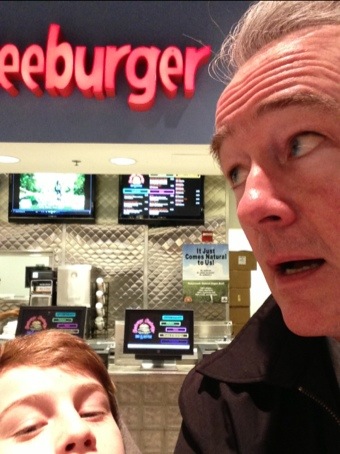Son Two (the goalie) wins, 6 to 1!
Next stop, Florida!
Angelo
Expert political analysis (updated)
Ford follies, a continuing series
Death by digital
Son One and I listened to the Toronto Star’s John Honderich on Metro Morning this morning. He was on to provide the company’s spin on letting go a whole bunch of employees and cutting back at Canada’s biggest newspaper.
Two things.
First: and Son One said it best, as he listened to Honderich say that a paywall was a good idea, because the New York Times had had success with a paywall. “But you’re not the New York Times,” said Son One. That said it all, I think. Smart kid.
Two: the media – and others in the business of selling content, in the way that media does – DID THIS TO THEMSELVES.
The example I like to use is compact discs. Remember when the music industry introduced them, more than three decades ago? The industry claimed that digitization was the way of the future, and that the public wouldn’t mind re-buying all the music they already owned, in the form of vinyl or tapes. That was a lie, of course. It was just another grubby money grab. Everyone knew it, too.
The music industry’s cynical ploy – their greed – ultimately was the thing that destroyed them. By pushing a medium that promoted digitized content, they had handed the keys to the vault to citizens. Enter Napster and the like, who figured out how take digitized content, and shop it around this cool new digital medium called “the Internet.” R.I.P., music industry.
I have never illegally downloaded music – not ever. Not once. For me, it’s an ideological position: I’m a (bad) musician, and I fervently believe unauthorized downloads hurt most the kinds of bands I love, guys like the ones I saw last night at the Horseshoe.
But there was schadenfreude to what the music biz did to itself, of course. And I had, and have, no sympathy for the corporate geniuses who slit their own throats with the digital money-grab. They were greedy, and they richly deserved what they got.
The news media’s self-immolation was different, but the result has been the same. When the opportunity came along to digitize content, they seized on it with glee. Except – unlike the music industry mavens – they gave their content away. They made it free.
The Internet was designed to be free, of course. So the news media deserve credit for how they sort-of embraced that, at the start. But they deserve no credit at all for never figuring out how to make money off the Internet.
After years of watching themselves bleed all over the floor, they have now decided (mixed metaphor alert!) to shut the barn door long after the horses – and the cows, and the sheep, and any farm animal that moves – have left. They’re gone, baby, gone.
IT’S TOO LATE. IT’S OVER. YOU ARE DEAD, LIKE DINOSAURS, YOU JUST DON’T KNOW IT YET.
Digitization changed the world. It gave birth to amazing new things. It has also killed off some things.
They’re not coming back.
The Queers – Punk Rock Girls
Media existentialism: nobody cares about you when you disappear
There are no bylines in the Toronto Star’s print edition today. Journalists there have pulled their bylines, as their collective agreement permits, to protest cuts and layoffs earlier this week.
You can debate whether it is an effective tactic or not. Personally, I mourn for the loss of every newspaper and every newspaper job. Our democracy is diminished by the slow death of newspapers – which, whether I like it or not, is fully underway.
The byline strike got me thinking existentially, however. It reminded me of something that happens to me – and perhaps to you – all the time.
It’s the disappearing of journalists. For years, you see them on TV, hear them on the radio, read them in newspapers. And then, one day, they are abruptly gone. Firings, layoffs, health, retirements, whatever. Whatever the reason, they’re gone.
And here’s the thing: I forget about them. People who had been so important to me, every day and for a long time, simply get forgotten. They disappear, and I don’t notice. Occasionally, something happens and I am fleetingly jarred into remembering them, and their writing. But, most of the time, I don’t remember anything at all.
With the exception of a few voices who I will always recall – Jay Scott, Dalton Camp, Peter Gzowski, Lester Bangs, a small number of others – I actually don’t remember most of them when they disappear. I just don’t.
This, I think, says more about me than the forgotten. Maybe it says something, too, about how transitory journalism really is. One minute you’re a big deal, the next minute you don’t exist.
So, selfishly, I ask: when I one day shut down this web site – and I will, I will – will most of you remember it?
I doubt it.
Votes and yarbles
I’ve thought Ontario has been heading towards one all along. Now my Sun colleague Chris Blizzard is prognosticating the same thing, albeit for different reaons.
Bonus: you also get to read about groundhogs being hung by their testicles!
Jack
Is it worth taking in? I’d say yes. Now, as Olivia herself said: “It’s just a movie,” but it was a pretty good one.
“They took some artistic licence,” she added. “Jack and I didn’t kiss that much.” That got a few laughs.
Anyway, it’s worth seeing. It tells the story of one of the most remarkable election campaigns in anyone’s memory – and it tells the story about a pretty remarkable fellow, too.
(Oh, and we were invited.)


